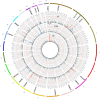Meta-analysis of up to 622,409 individuals identifies 40 novel smoking behaviour associated genetic loci
- PMID: 30617275
- PMCID: PMC7515840
- DOI: 10.1038/s41380-018-0313-0
Meta-analysis of up to 622,409 individuals identifies 40 novel smoking behaviour associated genetic loci
Abstract
Smoking is a major heritable and modifiable risk factor for many diseases, including cancer, common respiratory disorders and cardiovascular diseases. Fourteen genetic loci have previously been associated with smoking behaviour-related traits. We tested up to 235,116 single nucleotide variants (SNVs) on the exome-array for association with smoking initiation, cigarettes per day, pack-years, and smoking cessation in a fixed effects meta-analysis of up to 61 studies (up to 346,813 participants). In a subset of 112,811 participants, a further one million SNVs were also genotyped and tested for association with the four smoking behaviour traits. SNV-trait associations with P < 5 × 10-8 in either analysis were taken forward for replication in up to 275,596 independent participants from UK Biobank. Lastly, a meta-analysis of the discovery and replication studies was performed. Sixteen SNVs were associated with at least one of the smoking behaviour traits (P < 5 × 10-8) in the discovery samples. Ten novel SNVs, including rs12616219 near TMEM182, were followed-up and five of them (rs462779 in REV3L, rs12780116 in CNNM2, rs1190736 in GPR101, rs11539157 in PJA1, and rs12616219 near TMEM182) replicated at a Bonferroni significance threshold (P < 4.5 × 10-3) with consistent direction of effect. A further 35 SNVs were associated with smoking behaviour traits in the discovery plus replication meta-analysis (up to 622,409 participants) including a rare SNV, rs150493199, in CCDC141 and two low-frequency SNVs in CEP350 and HDGFRP2. Functional follow-up implied that decreased expression of REV3L may lower the probability of smoking initiation. The novel loci will facilitate understanding the genetic aetiology of smoking behaviour and may lead to the identification of potential drug targets for smoking prevention and/or cessation.
Conflict of interest statement
Paul W. Franks has been a paid consultant for Eli Lilly and Sanofi Aventis and has received research support from several pharmaceutical companies as part of European Union Innovative Medicines Initiative (IMI) projects. Neil Poulter has received financial support from several pharmaceutical companies that manufacture either blood pressure lowering or lipid lowering agents or both and consultancy fees. Peter Sever has received research awards from Pfizer. Mark J. Caulfield is Chief Scientist for Genomics England, a UK government company. Adam Butterworth reports grants from Merck and Pfizer and grants outside of this work from AstraZeneca, Biogen, and Novartis, and personal fees from Novartis. John Danesh reports grants, personal fees and non-financial support from Merck Sharp & Dohme (MSD), grants, personal fees and non-financial support from Novartis, grants from British Heart Foundation, grants from European Research Council, grants from NIHR, grants from NHS Blood and Transplant, grants from Pfizer, grants from UK MRC, grants from Wellcome Trust, grants from AstraZeneca, outside the submitted work. Laura J. Bierut is listed as an inventor on Issued U.S. Patent 8,080,371,“Markers for Addiction” covering the use of certain SNPs in determining the diagnosis, prognosis, and treatment of addiction.
Figures


References
-
- O'Donnell CJ, Nabel EG. Genomics of Cardiovascular Disease. New Engl J Med. 2011;365:2098–109. - PubMed
Publication types
MeSH terms
Grants and funding
- RG/13/13/30194/BHF_/British Heart Foundation/United Kingdom
- 16/136/68/DH_/Department of Health/United Kingdom
- MR/L01341X/1/MRC_/Medical Research Council/United Kingdom
- G9521010D/MRC_/Medical Research Council/United Kingdom
- MR/S003746/1/MRC_/Medical Research Council/United Kingdom
- RG/07/005/23633/BHF_/British Heart Foundation/United Kingdom
- MR/R023484/1/MRC_/Medical Research Council/United Kingdom
- 084723/Z/08/Z/WT_/Wellcome Trust/United Kingdom
- ETM/55/CSO_/Chief Scientist Office/United Kingdom
- MC_UU_00007/10/MRC_/Medical Research Council/United Kingdom
- 083948/WT_/Wellcome Trust/United Kingdom
- RP-PG-0407-10371/DH_/Department of Health/United Kingdom
- SP/09/002/BHF_/British Heart Foundation/United Kingdom
- G0601966/MRC_/Medical Research Council/United Kingdom
- 098381/WT_/Wellcome Trust/United Kingdom
- G1001799/MRC_/Medical Research Council/United Kingdom
- G0800270/MRC_/Medical Research Council/United Kingdom
- RE/13/5/30177/BHF_/British Heart Foundation/United Kingdom
- MR/N01104X/2/MRC_/Medical Research Council/United Kingdom
- RC4 AG039029/AG/NIA NIH HHS/United States
- U01 AG009740/AG/NIA NIH HHS/United States
- MC_U106179471/MRC_/Medical Research Council/United Kingdom
- 104036/Z/14/Z/WT_/Wellcome Trust/United Kingdom
- SP/04/002/BHF_/British Heart Foundation/United Kingdom
- SP/08/005/25115/BHF_/British Heart Foundation/United Kingdom
- MC_QA137853/MRC_/Medical Research Council/United Kingdom
- MR/N011317/1/MRC_/Medical Research Council/United Kingdom
- MR/K023241/1/MRC_/Medical Research Council/United Kingdom
- R01 GM126479/GM/NIGMS NIH HHS/United States
- R21 DA040177/DA/NIDA NIH HHS/United States
- RG/08/014/24067/BHF_/British Heart Foundation/United Kingdom
- BTRU-2014-10024/DH_/Department of Health/United Kingdom
- G1000861/MRC_/Medical Research Council/United Kingdom
- CZD/16/6/CSO_/Chief Scientist Office/United Kingdom
- 212945/Z/18/Z/WT_/Wellcome Trust/United Kingdom
- MR/L01632X/1/MRC_/Medical Research Council/United Kingdom
- 20861/CRUK_/Cancer Research UK/United Kingdom
- MC_PC_12010/MRC_/Medical Research Council/United Kingdom
- MR/M013111/1/MRC_/Medical Research Council/United Kingdom
- PG/02/128/BHF_/British Heart Foundation/United Kingdom
- MR/K026992/1/MRC_/Medical Research Council/United Kingdom
- MR/L003120/1/MRC_/Medical Research Council/United Kingdom
- C490/A16561/CRUK_/Cancer Research UK/United Kingdom
- MC_UU_12015/1/MRC_/Medical Research Council/United Kingdom
- R01 HL119443/HL/NHLBI NIH HHS/United States
- R01 DK062370/DK/NIDDK NIH HHS/United States
- MR/N01104X/1/MRC_/Medical Research Council/United Kingdom
- R01 HG008983/HG/NHGRI NIH HHS/United States
- RC2 AG036495/AG/NIA NIH HHS/United States
- 268834/ERC_/European Research Council/International
- U01 DK062370/DK/NIDDK NIH HHS/United States
- 090532/WT_/Wellcome Trust/United Kingdom
- MR/S003762/1/MRC_/Medical Research Council/United Kingdom
- 085475/WT_/Wellcome Trust/United Kingdom
- R01 HD057194/HD/NICHD NIH HHS/United States
- 10119/CRUK_/Cancer Research UK/United Kingdom
- RG/14/5/30893/BHF_/British Heart Foundation/United Kingdom
- MC_PC_17228/MRC_/Medical Research Council/United Kingdom
- BB/F019394/1/BB_/Biotechnology and Biological Sciences Research Council/United Kingdom
- HPRU-2012-10141/DH_/Department of Health/United Kingdom
- WT098051/WT_/Wellcome Trust/United Kingdom
- 16561/CRUK_/Cancer Research UK/United Kingdom
- 10124/CRUK_/Cancer Research UK/United Kingdom
- G0700931/MRC_/Medical Research Council/United Kingdom
LinkOut - more resources
Full Text Sources
Miscellaneous

